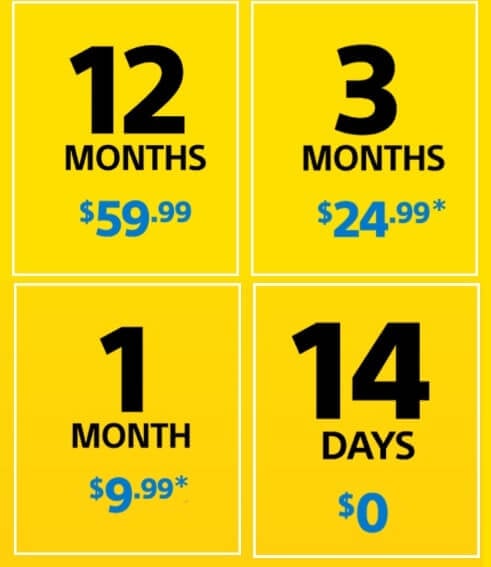If you’re thinking about getting a PlayStation or already have one, but are considering buying a PlayStation Plus, we’ve got all the information you need to decide whether the PlayStation Plus is for you.
So, What is PlayStation Plus?
In a nutshell, PlayStation Plus is a subscription service that you have to pay for over and above the cost of the console and the cost of individual video games. You can subscribe on a monthly, three-monthly or annual basis. The service becomes cheaper the more you pay upfront.
How Much Does PlayStation Plus Cost?
If you’ve never been a subscriber, you’ll get the first 14 days of PlayStation Plus for free. If you bought your console new, there’s also a good chance that there’s a voucher for a few months free included in the box, depending on the bundle you purchase. There are three options for the subscription:
1 Month – $9.003 Months – $24.9912 Months – $59.99
You can also buy prepaid cards, which are sometimes offered through third-party sellers that run sales and discounts. This is a good opportunity to pick up a year’s worth of the service for less. Just be sure you’re buying the correct card for your region.
What Can I Do With PlayStation Plus?
If you choose to subscribe to PlayStation Plus, there are some features you get beyond the standard experience. The most important feature for most people is multiplayer gaming. If you want to play games with your friends over the internet, you really have no choice but to fork out for a PlayStation Plus subscription. There are exceptions to this. In general, free-to-play games don’t require a PlayStation Plus subscription. Some games that have their own subscription fees, such as Final Fantasy XIV, can be played without paying for the Plus service. The other exclusive feature is cloud storage. You get 100GB of cloud storage if you’re a PlayStation Plus subscriber. This storage space is used to upload and sync save game data. This is very handy if your PlayStation dies or you have two consoles and want to sync saved games between them. These are the only two features we think can be considered “core” to the PlayStation experience. If you can live without premium game multiplayer or cloud saves, the case for PlayStation Plus is much less compelling.
Sharing PlayStation Plus Benefits
The PlayStation 4 is designed to be a shared system. You can have multiple accounts on one machine. Everyone can play all the games on the console, under the condition that the game belongs to a user who has that console registered as their primary console. So, do you need to buy a PlayStation Plus subscription for every user on the console to benefit? The answer is that it depends. When it comes to multiplayer, every person on that console can play online, as long as at least one person has PlayStation Plus membership and that’s their primary console. Also, unsurprisingly, any games bought by the Plus subscriber are still available for everyone else. That includes the “free” PlayStation Plus games, which we’ll get to in a moment. Sadly, other users on the system do not get access to the cloud save feature. Which means that if something happens to that PS4, only the Plus user will have their saved games in a safe place.
How Do The “Free” Games Work?
At the time of writing, Plus subscribers get at least two PS4 games every month as part of their subscription. You have no choice in which games are offered. This means that it could be a game you’ve already purchased in the past or that just doesn’t interest you. Your license to play the game is also tied to your subscription service. Which means that if you let your Plus subscription lapse, you can’t play those games anymore. This also means that you need to connect to the internet from time to time so that the game can renew your license. On the upside, even if you let your subscription laps, PlayStation Plus games you’ve claimed in the past remain in your download list. So if you ever restart the subscription, you can play those games again. In the past, PS3, Vita, PSP and PS4 games were included each month, but Sony has recently stopped them all except for the PS4 titles. Most likely in preparation for the PS5.
The PlayStation Plus Value Proposition: Discounts, Exclusive Content And Free Games
When deciding on PlayStation Plus, there are lots of different factors to take into account in terms of whether it’s worth the price. Online gaming and cloud backups are certainly worth the cost of the service, but only if you’re actually going to use those features. So what about the rest? Looking at the history of free games with PlayStation Plus, it’s certainly a fantastic deal in pure dollar terms. If you have to buy those games separately, any two of the premium titles are likely to cost more than a year of Plus. How much that is worth to you will depend on the titles, your tastes and how many of the games you already own. It also depends how often you normally buy new games. The same goes for exclusive content. Plus members get avatars, in-game content and various other digital items that are exclusive. However, they might not be for titles you play or care about. Making it a very personal factor. From our point of view, aside from multiplayer and cloud, it’s the Plus-only digital discounts that easily make up the cost. If you buy (on average) one or two games on sale every month and take advantage of the additional discount percentage of Plus, you’ll make back the money and more. Most importantly, you’ll be getting those discounts on games that you choose and actually want.
PlayStation Plus and the Next Generation
At the time of writing, no one knows how PlayStation Plus will work on the upcoming PlayStation 5. The assumption is that the core offering will be the same, but of course Sony may have changes in store. Given that the PS5 is meant to be backwards compatible with PS4 games, we could be looking at four games a month via Plus that will work on the PS5 console. Also keep in mind that you’ll most likely be able to redeem free PS5 games as a Plus subscriber, even if you don’t yet own a PS5. PlayStation Plus has been with us since the PlayStation 3 era. As consoles have become even more online-centric, we expect the next generation experience to be even more deeply entwined with the service.







